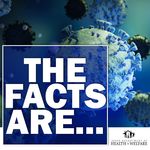JOHNSON & JOHNSON VACCINES, COVID-19 VACCINES FOR YOUNGER CHILDREN: Idaho Coronavirus
←
→
Page content transcription
If your browser does not render page correctly, please read the page content below
October 18, 2021
Welcome to the Department of Health and Welfare’s monthly briefing
on the department’s latest news, communications activities, and
resources for the COVID-19 pandemic.
New sections are marked “NEW,” and all other sections are up-to-date as of
the time of publishing.
INFORMATION
FDA ADVISORY COMMITTEE MEETINGS ON BOOSTER DOSES FOR MODERNA AND
JOHNSON & JOHNSON VACCINES, COVID-19 VACCINES FOR YOUNGER CHILDREN:
The Food and Drug Administration’s (FDA) Vaccines and Related Biological Products Advisory Committee (VRBPAC)
met last week to discuss the use of booster doses of the Moderna COVID-19 Vaccine and the Janssen COVID-19
Vaccine. Both vaccines are currently authorized for emergency use to prevent COVID-19 in individuals 18 years of
age and older.
The committee voted to recommend an Emergency Use Authorization for booster doses for both Moderna and the
Johnson & Johnson vaccines. More details will be available when the FDA takes action on the recommendation, and
the Centers for Disease Control and Prevention issues a recommendation.
VRBPAC will meeting again on Oct. 26 to discuss Pfizer COVID-19 vaccine for children ages 5-11.
Learn more:
FDA: https://www.fda.gov/emergency-preparedness-and-response/counterterrorism-and-emerging-threats/
coronavirus-disease-2019-covid-19#new
CDC: https://www.cdc.gov/coronavirus/2019-ncov/index.html
DHW’S DIVISION OF BEHAVORIAL HEALTH ISSUES A PANDEMIC SURVEY
INFORMATION
The COVID-19 pandemic has disrupted economies, businesses, schools, healthcare services, and the lives of
Idahoans throughout the state. The Division of Behavioral Health in the Idaho Department of Health and Welfare is
conducting an anonymous statewide survey to better understand how attitudes, needs, and behaviors of Idahoans
have continued to evolve in relation to the pandemic.
The survey is open to all Idaho residents through Oct. 31, 2021, and can found at: https://app.keysurvey.com/
f/41586564/24e3/
Read the press release: https://healthandwelfare.idaho.gov/news/division-behavioral-health-launches-survey-find-
out-how-idahoans-are-faring-pandemic
1INFORMATION CRISIS STANDARDS OF CARE IN IDAHO
Crisis Standards of Care has been activated statewide by the Department
of Health and Welfare, but the hospitals will implement according to their
own policies and available resources guided by Crisis Standards of Care.
Crisis Standards of Care is a last resort. It means the number of patients
needing care is more than the amount of resources (e.g. space, equipment,
etc.) available. Activation was driven by a surge of COVID-19 patients that
exceeded hospital staff and facility resources.
People who need emergency medical care should seek it and not delay it.
Hospitals and their staffs will give the best care they are able to provide.
Not seeking care in a timely fashion could result in worse outcomes.
Learn more:
https://healthandwelfare.idaho.gov/crisis-standards-care
INFORMATION
MONOCLONAL ANTIBODY TREATMENTS ARE AVAILABLE TO
AT-RISK IDAHOANS IN LIMITED SUPPLY
U.S. Food and Drug Administration (FDA) has issued Emergency Use Authorization (EUA) for several
monoclonal antibody treatments for mild or moderate COVID-19 for those at high risk of developing severe
disease and hospitalization due to COVID-19. Due to limited supply, however, there is no guarantee the
treatment will be available for everyone, and it may not be effective in all cases. The COVID-19 vaccine
remains the best protection against severe disease, hospitalization, and even death.
What is monoclonal antibody treatment? Who’s eligible
Monoclonal antibodies are laboratory-made The treatment is reserved for high-risk patients. It
molecules that act as substitute antibodies. They requires a referral from a doctor or other healthcare
can help your immune system recognize and provider and a positive virus test, which is an FDA-
respond more effectively to the virus, making it more approved or authorized COVID-19 test that finds the
difficult for the virus to reproduce and cause harm. virus’ genetic material or molecules from its surface.
Monoclonal antibodies have shown to be effective
in reversing sickness caused by COVID-19 and have Where to receive treatment?
reduced the risk of hospitalization by 70 percent in
clinical trials. However, they do not teach the body to It is available from a growing number of healthcare
produce its own antibodies and may leave a person providers in Idaho, but they’re still limited because
exposed to future COVID-19 infection. manufacturers cut back on production when the
pandemic slowed in the spring and summer of
Monoclonal antibody treatments are not a
2021. Sites are listed at https://protect-public.hhs.
replacement for the COVID-19 vaccine, which
gov/pages/therapeutics-distribution. Your provider
remains the best way to protect from severe illness,
will need to refer you for treatment if you are ill with
hospitalization or death.
COVID-19 and qualify.
There’s no guarantee you’ll have access to
monoclonal antibody treatment if you get sick. The
vaccine is still the best tool we have to prevent
serious illness and hospitalization.
2INFORMATION
COVID-19 BOOSTER • People ages 65 years and older
DOSE UPDATE • Residents of long-term care facilities
• People ages 50-64 with underlying medical
conditions
The Food and Drug Administration (FDA) and
the Centers for Disease Control and Prevention • People ages 18-49 with underlying medical
(CDC) authorized and recommended booster conditions, based on individual benefit and
doses of the Pfizer/BioNtech COVID-19 vaccine risk
for certain people in late September. • People ages 18-64 at an increased risk of
exposure and transmission due to the type
Those eligible for a single booster dose of the of work they do (including teachers and
Pfizer COVID-19 vaccine are those who received healthcare workers) or because they live or
their second dose of the Pfizer vaccine at least work in an institutional setting
six months earlier and who fall into one of these
categories:
More information is coming soon about those
who received Moderna and Johnson & Johnson
vaccines.
Read the full press release from DHW
UNDERSTANDING AND SUPPORTING
HOSPITAL CAPACITY NEEDS
DHW’s Division of Public Health leadership meets daily
with hospital leaders through the Idaho Medical Operations
Coordination Cell (I-MOCC) call. This is a voluntary forum to
share information and work together to solve problems.
At this call, DHW staff works to:
Document and understand the current conditions at
hospitals, focusing on solving patient movement or resource
needs in real time to the extent possible. As part of this
discussion, each hospital in attendance reports out on the
following:
• Patient status
• Bed availability
• Patient transfer needs
• Other resource needs and shortages
• Staffing challenges
• Triage team activation and operational status
3DHW PROVIDES ACCURATE INFORMATION EVERY DAY TO HELP
COMBAT COVID-19 MISINFORMATION AND DISINFORMATION
One of the issues that all government and healthcare organizations face during the pandemic is the
abundance of false and misleading information available on social media and other communications
channels.
DHW remains focused on delivering accurate and up-to-date information daily through the following
channels:
• Social media - Twitter, Facebook, Instagram, YouTube, and LinkedIn
• DHW Voice blog (new posts on Tuesdays and Fridays)
• Weekly COVID-19 media briefings
• Coronavirus website and DHW website
• Daily responses to information requests from the public and the media
• Public Service Announcements
The following are examples of the false and misleading information that appears regularly on social media
and the factual information that we share.
FALSE: You can get COVID-19 from the vaccine.
FACT: You cannot get COVID-19 from the vaccine.
FALSE: The mRNA vaccine alters your DNA.
FACT: No, it does not. It also is not gene therapy. DHW Director Dave Jeppesen wrote a blog about how the
mRNA vaccine actually works in his Aug. 27 blog.
FALSE: All events reported to the federal Vaccine Adverse Event Reporting System (VAERS) are caused by
vaccination.
FACT: No. VAERS data alone cannot determine if the reported adverse event was caused by a COVID-19
vaccination.
(CONTINUED ON NEXT PAGE...)
4(...CONTINUED)
DHW PROVIDES ACCURATE INFORMATION EVERY DAY TO HELP
COMBAT COVID-19 MISINFORMATION AND DISINFORMATION
Everyone, including patients and their healthcare providers, can report events to VAERS, even if it is
not clear whether a vaccine caused the problem. Some VAERS reports may contain information that is
incomplete, inaccurate, coincidental, or unverifiable.
Serious adverse events reported into VAERS are studied by vaccine safety experts who look for unusually
high numbers of health problems, or a pattern of problems, after people receive a vaccine.
The Department of Health and Welfare (DHW) reviews VAERS reports that indicate a serious adverse
event for Idaho residents.
Recently, the number of deaths reported to VAERS after COVID-19 vaccination has been misinterpreted
and misreported as deaths proven to be caused by vaccination. However, reports to VAERS of adverse
events after vaccination, including deaths, do not necessarily mean that a vaccine caused a health
problem.
Learn more about VAERS.
INFORMATION
VACCINATION STATUS OF COVID CASES
VACCINATION STATUS OF COVID-19 CASES
MAY 15 – OCT. 9, 2021
CASES
88.0% of cases were not
fully vaccinated
69,151/78,584 NOT FULLY VACCINATED
HOSPITALIZATIONS 2,837/3,160 NOT FULLY VACCINATED
89.8% of people hospitalized
were not fully vaccinated
ICU STAYS 454/493 NOT FULLY VACCINATED
92.1% of people in the ICU
were not fully vaccinated
DEATHS 869/958 NOT FULLY VACCINATED
87.1% of people who died
were not fully vaccinated
*FULLY VACCINATED: SARS-CoV-2 was detected ≥14 days after receiving the second dose of a = 100 FULLY
VACCINATED PEOPLE
2-dose series or a dose of 1-dose COVID-19 vaccine, with no history of a
positive PCR test in the 45 days prior. = 100 NOT FULLY
VACCINATED PEOPLE
5ADDITIONAL COVID-19 DATA
COVID-19 statistics, including breakthrough cases and vaccination status of cases, can be found on the
COVID-19 Case, Laboratory, and Hospital Data Dashboard. State-level case, laboratory, and hospital data
is updated by 5 p.m. MT seven days a week, excluding holidays. Data on variants of concern and percent
positivity is updated by 5 p.m. MT on Thursdays.
The COVID-19 Vaccine Data Dashboard includes data on COVID-19 vaccinations by county, public health
district, age group, race, and ethnicity.
DHW SOCIAL MEDIA
CAMPAIGNS
DHW continues to target misinformation and
disinformation on all of our social media platforms,
and on our blog at dhwblog.com. Posts continue to
debunk the latest vaccine-related myths, and share
information about where to get vaccinated as well
as daily updates on percent positivity, case counts,
and vaccination milestones. Follow us on Facebook,
Twitter, Instagram, and LinkedIn.
Getting vaccinated yourself may
also protect people around you,
particularly people at increased risk
for severe illness from COVID-19.
COVID-19 VACCINATION INFORMATION ONLINE
The COVID-19 vaccination information web page includes information on when and where to get
vaccinated, and what to expect at a vaccine appointment. The COVID-19 vaccine section on the
coronavirus website is updated regularly. The page includes the comprehensive COVID-19 vaccine FAQ,
recordings of DHW’s media briefings, a list of underlying medical conditions that put people at greater
risk for COVID-19, and the Governor’s actions, among other resources. There is also a link available with
resources for COVID-19 vaccine providers.
6MEDIA BRIEFINGS
DHW hosts regular briefings for the media about COVID-19
in Idaho. The next one is Oct. 19. The remote events have
included updates from Gov. Little and DHW officials, followed
by a question-and answer session with members of the media.
The general public can listen in. For more information about
the briefings, visit coronavirus.idaho.gov. Recordings of past
media briefings are posted on the coronavirus website under the
vaccine tab.
COV
COM ID-1
FOR M 9 JOIN THE
UM
JOIN THE
CALL
CALL
SCHOOLS
Updated weekly summaries of THE
COVID-19 cases associated with JOIN LL COMM
CA FORUM
schools are available each Monday
on the coronavirus website under
the “Schools” tab. COMMUNICATIONS FORUM
DHW’s Office of Communications, in partnership with the
Gov. Brad Little’s communications director, hosts a forum for
communications professionals in state agencies, health districts,
healthcare agencies and facilities, and stakeholders to discuss
COVID-19-related communications efforts and strategies.
The next meeting is Oct. 25. If you are a communications
professional and would like to join the call, send an email to
communications@dhw.idaho.gov.
LONG-TERM CARE
FACILITIES
The summary of COVID-19 cases
and deaths associated with long-
term care facilities in Idaho is
published on the coronavirus
website on Fridays under the “Long-
Term Care” tab.
7You can also read



























































